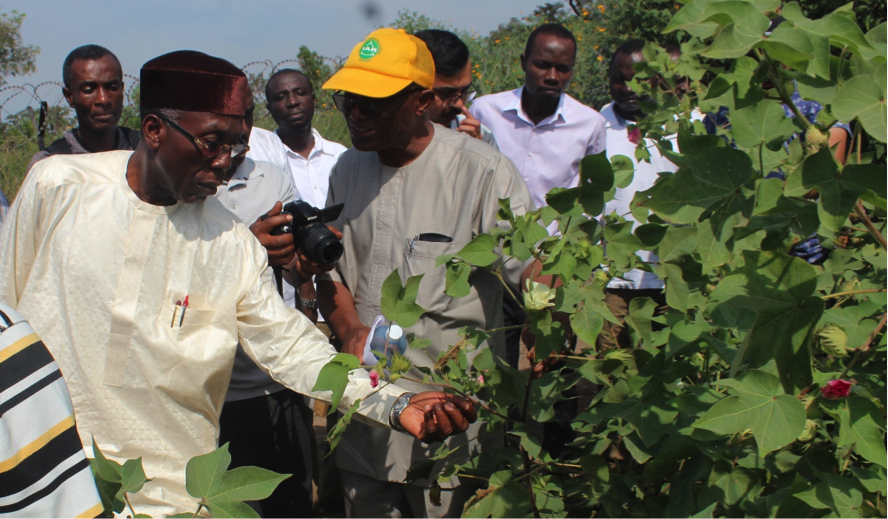
Nigerian officials say their nation is on track to commercialize genetically engineered cowpea and cotton this year. Both crops contain the Bt gene to confer pest resistance.
Nigeria officially signed the biosafety bill into law in 2015, making it eligible to join the league of nations that are already using genetic engineering (GE), also called genetic modification (GM), to boost food production and alleviate hunger and poverty. The National Biotechnology Management Agency (NBMA) regulates the technology.
Nigeria s federal government had earlier set a timeline for commercialization of GE cotton and cowpea. Dr. Issoufou Kollo Abdourhamane, regional head of the African Agricultural Technology Foundation (AATF), and Dr. Rose Gidado, deputy director of the National Biotechnology Development Agency (NABDA), agreed that their agencies are not envisioning any delay in commercialization of the two products. The crops are going through the final stages of trials, and stakeholders have already collected data and are currently developing a dossier to show the crops are safe before they are released to the public, they said.
Once the dossier is presented and approved by the National Varietal Release Committee made up of breeders and relevant stakeholders, as well as the NBMA then the crops would be ready for deregulation, they said.
Meanwhile, other GE food crops are currently at various stages of confined field trials (CFTs) in the nation. They include the nitrogen use efficient, water use efficient and salt tolerant (NEWEST) rice; the African bio-fortified sorghum (ABS); Bt maize; herbicide tolerant soybeans, and virus resistant cassava enhanced with iron and zinc.
Researchers are optimistic that the bio-fortified sorghum and NEWEST rice are the next likely prospects for commercialization, in about three years. They say that timeframe will allow researchers to complete all the necessary backcrosses to transfer the desired traits to Nigerian local varieties.
New entrants
The biotechnology sector is also expecting the entrance of two new GE cassava crops into its fold this year: the genetically modified cassava (AMY3 RNAi Transgenic lines) and the virus resistant cassava for Africa (VIRCA) project.
The main objective of the GM cassava trial, which is currently purely for research, is to prolong root storage of cassava, which is the most nagging challenge of cassava breeders. The gene construct used was developed at ETH Zurich in the laboratory of Prof. Samuel C. Zeeman. The NBMA last year approved a CFT of the GE cassava jointly sponsored by the Institute for Tropical Agriculture (IITA) and ETH- Zurich which will officially get under way this year.
Meanwhile, the VIRCA Plus project is developing cassava that carries resistance to two viral plant diseases: the Cassava Brown Streak Disease (CBSD), which destroys the edible roots even when rest of the plant looks healthy; and Cassava Mosaic Disease (CMD), which can stunt or kill plants outright. These two diseases are often found together in the same field and can devastate entire crops. Both diseases are spread by white-flies (which cannot be controlled with pesticides) and by infected cuttings that are unknowingly shared among farmers.
Last year was also eventful for biotech in Nigeria. In addition to an intensive public awareness campaign about the applications of agricultural biotechnology, the nation saw some of its top leaders support genetic engineering. One of the most striking was the endorsement of Bt cotton by the Minister of Agriculture, Chief Audu Ogbeh, when he visited the crop s trial site at the NABDA complex in Abuja. Prior to that, the agency had been having a tough time getting policy makers to support the commercialization of GM crops.
Another striking event of 2017 was the impounding and repatriation of 90 tonnes of GM maize destined for feed meal processing by the NBMA and Nigerian Custom Service (NCS). The shipment, valued at about $10 million, was sent back to Australia due to illegal importation. However, NBMA officials said the importer of the GM maize had since secured a permit from the agency for the importation of the maize, which has been determined safe.
Despite the advances, biotechnology development in Nigeria continues to face challenges. A consortium of 17 Nigerian civil groups led by the Health of Mother Earth Foundation is preparing to launch a lawsuit against the NBMA and other defendants over permits issued by the agency for GE cotton and maize in the country. Our correspondent learned that the suit is expected to proceed Jan. 24, when it would be officially mentioned in federal high court, Abuja.
